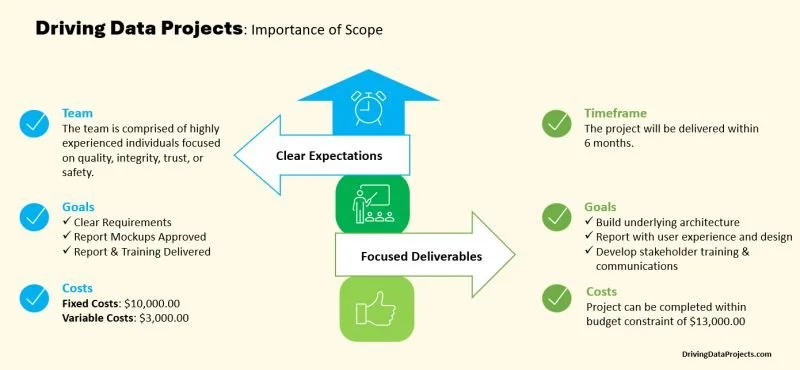All Technology Projects are Data Projects
One of the biggest ideas in Driving Data Projects (the book) is that "all technology projects are data projects." Yet data is still an afterthought in many organizations—even with AI on the horizon (or now, in many firms' backyards).
Author of Data Quality: The Field Guide, Tom Redman, popularized the idea that the most important moments in a piece of data's lifetime are the moment it is created and the moment it is used. These moments often occur outside of IT. The business consumes vast amounts of data, emphasizing the importance of business involvement in data quality management. Those who have provisioned and consumed data know from experience that bad data dies hard. It will get rid of you if you don't get rid of it.
4 Perspectives to drive effective data translation
When driving data projects, you will encounter business stakeholder challenges that often go unspoken. This is not always because people hold back but because they don't fully know how to vocalize their constraints.
If they can't directly address their requirement, chances are we can't either. To hear others' speech, we start by asking questions from different perspectives.
What does it take to become data-driven?
Since most people don’t know a lot about IT organizations or data teams it’s important to understand why moving from ad hoc efforts to a mature approach to driving data projects makes sense. The timing might not be right (now). Becoming data-driven through data as a service requires a serious investment of resources, finances, staff, equipment, services, etc.; scaling efforts will only increase those topline demands. It’s a serious ongoing commitment many organizations find themselves surprised by—even today.
Back to Basics: The Benefits of Data Projects
Data teams should be regarded as intentional business partners because they provide the underlying technology that enables business strategy and maintains data as a corporate asset. They can help educate business partners on the upstream and downstream impacts of poor data quality, and they can help cultivate more effective ambassadors for data governance across the organization.
Finding Meaning in Data Projects by Asking: Why
Most data teams cover WHAT and HOW with standard reports and KPIs. They will optimize processes and analyze business domains impacting the company's bottom line from a data perspective.
But how many data teams truly understand the WHY behind the reports they generate? How many actively consult with the business as a true partner to understand the underlying business concerns behind the numbers? Without the WHY, delivering true value in the WHAT and HOW is ten times harder.
The importance of scope
n driving data projects, I find people underestimate the impact of scoping projects effectively.
Too often, you see technology leads with new platforms or tools looking for a problem to solve, or business leads with a unique one-off request from an executive reporting forum carry over to a data team as a priority requirement, whether it is or not.
Dos and Dont's for Data Analysts Relying on ChatGBT
Data analytics is filled with complexity. Anyone saying otherwise is selling products. Knowing the data sources, data sets, general lineage, and behavior of the numbers are table stakes for the average data consumer. We must know where our data comes from. Much like we need to know where our food comes from and how it's processed. Is it safe to consume?
Lately, I’ve heard many stories about early career folks with data analyst titles turning to ChatGBT for help because they don't know where to go with questions. ChatGBT should only be used when the output can be rigorously challenged, which can only happen if you have the foundational knowledge of how the output was generated. Here are some handy Do’s and Don’ts to remember before turning to ChatGBT.
BOOK ANNOUNCEMENT, OPPORTUNITY TO PRE-ORDER!
After teaching informatics for seven years, I’ve got a new book coming out! Driving Data Projects.
It’s a love letter to my students and a guide to my fellow colleagues. Many employees seek out or are thrust into a series of responsibilities in data management for which there is little formal training. How they engage with data in those roles impacts the privacy and security of consumer data and overall risk to the company's bottom line. The problem?
They aren’t quite sure how data works or how to drive data projects, not really. Today, almost all projects involve data to some degree, yet the data aspect is not adequately addressed.








